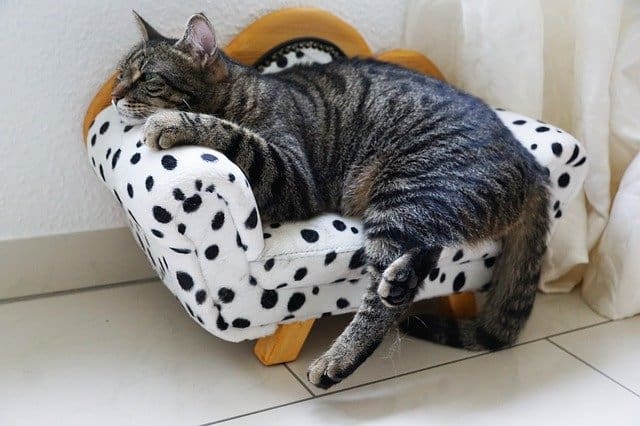
Leukemia disease in cats, unlike humans, is caused by a virus, called feline leukemia virus, known as FeLV. Unfortunately, it is a very serious disease. At Petlifey, we explain how to know if your cat has leukemia and identify the symptoms.
What is feline leukemia
Feline leukemia disease is caused by a virus that attacks the cat’s defenses (making it weaker to fight other ailments). When we refer to leukemia in cats, we are talking about the FeLV virus ( Fe line L eukemia V irus).
The feline leukemia virus is a retrovirus that infects kittens, and as it is incorporated into the genetic material of the cell, this makes this virus very difficult to treat.
This virus is the culprit of numerous illnesses and complications that appear afterwards and that can be fatal. One of these is feline leukemia, but there are more. Other diseases that are derived from FeLV are:
- Liver (liver) diseases.
- Abortions
- Anemia.
- Opportunistic infections.
- Leukopenia
Specifically, what is feline leukemia disease?
It is a cancer that affects the white blood cells of the cat. Leukocytes are a type of white blood cell found in the bone marrow and blood, and are the “defenses” of the body, because they are responsible for protecting your kitty’s body against infections and other external agents.
If your feline has feline leukemia, the cat’s immune system loses its vigor and the animal cannot fight other diseases that will appear later. These kitties can have complications even from a simple cold.
Symptoms of Leukemia in Cats
Feline leukemia symptoms vary, because FeLV infection can progress in different ways. If a leukemia itself occurs, it is usually acute, that is, it develops very quickly.
In this way you can detect thinning and weakness in your pet, which will also be more prone to multiple infections. Other times a lymphoma develops, which is a kind of tumor.
Lymphomas, in young felines, usually appear in an area of the body called the mediastinum, which causes difficulty in breathing and swallowing.
Regarding middle-aged animals, lymphomas appear in several organs and there is a deterioration in the general health of the kitten. On the other hand, in older cats it affects the digestive system and causes diarrhea and vomiting.
How do I know if a cat has leukemia?
There are signs, signs and symptoms in your kitten and the way they behave that can make you alert. This virus can harm your kitty in different ways.
Initially, if contagion occurs, there will be an initial phase that will last between two weeks and three months, in which symptoms may not be observed.
But later the signs of the disease may appear. If present, the symptoms of leukemia in cats are diverse and may include some of the following symptoms.
If your feline suffers from this disease, it will not have all the signs, but you may detect 4 or 5, if so, you should take your pet to the vet.
Feline leukemia symptoms
- You may eat little or stop eating.
- A cat with leukemia may have paler gums than usual.
- It may be yellowish in the mouth or the whites of the eyes.
- The kitten will have a fever.
- You may have a low overall tone and become increasingly listless.
- You may have diarrhea.
- You can vomit very often.
- A cat with leukemia may have difficulty breathing (you may hear her breathing).
- Sick easily and new diseases appear (anemia, respiratory, oral bladder, etc.).
- Hair can get unsightly and wounds can appear on the skin.
- They neglect their personal hygiene.
- You may have swollen lymph nodes.
- He may relieve himself outside the sandbox.
With these symptoms of feline leukemia, you can know what things can alert you to consult with your veterinarian. The specialist will do a blood test on your cat and will tell you with complete certainty if your pet has leukemia.
How much does the cat leukemia test cost?. This varies depending on the vet.
Treatments for leukemia in cats

There are vaccines to prevent feline leukemia that are useful in felines that go outside and in kittens that live in groups. In any case, some vaccines have side effects, therefore, they should only be used in at-risk felines.
The specialist will carry out a test to know if your feline has been in contact with this virus and will study the signs that your pet has and the values of a blood test to be able to make a diagnosis and a prognosis.
Normally, cats that live in groups and strays are more prone to feline leukemia than kittens that come alone. This is because the virus is mostly transmitted through urine and saliva.






